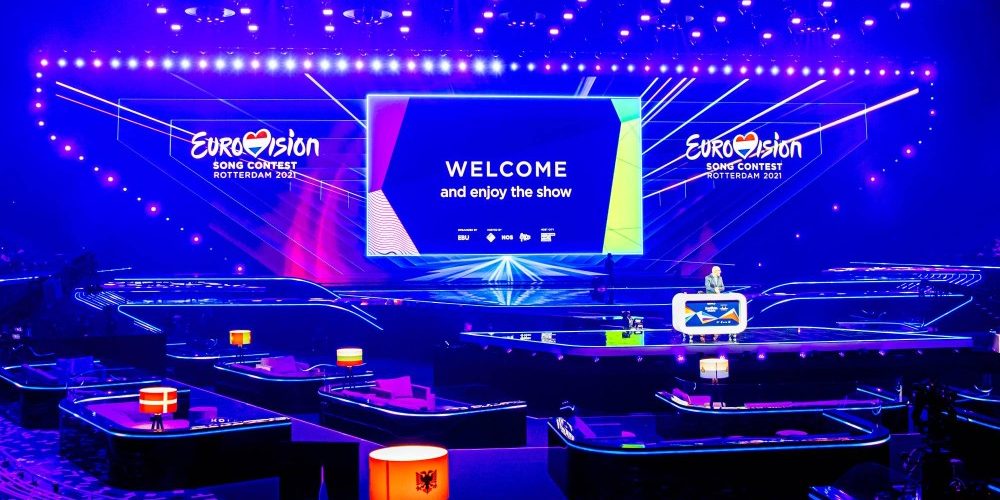Russia no longer allowed to compete in Eurovision 2022 following Ukraine invasion
Russia has been banned from competing in this year’s Eurovision Song Contest, following backlash to an earlier statement saying the country would be allowed to compete despite launching a military assault on Ukraine.
Ukraine has officially severed diplomatic ties with Russia, and declared martial law, after Russian President Vladimir Putin ordered an attack on the neighbouring nation on Thursday (February 24).
At the time of writing, at least 137 civilians have been killed in Ukraine with 316 injured (via The Guardian). It is currently being reported that Russian forces are now approaching Kyiv, the country’s capital (via BBC News).
The UK, European Union, US and Australia have imposed sanctions on Russia in response, with Putin warning of “consequences you have never seen” if the West attempts to interfere.
Many figures from the music world continue to condemn the attacks. Organisers of the Eurovision Song Contest initially said that the event would host singers from both Russia and Ukraine in May, writing in a statement: “The Eurovision Song Contest is a non-political cultural event which unites nations and celebrates diversity through music.
“The EBU’s public broadcaster members in both Russia and Ukraine have committed to participating in this year’s event in Turin and we are currently planning to welcome artists from both countries to perform in May. We of course will continue to monitor the situation closely.”
It's official! ? Kalush Orchestra will represent Ukraine ?? at #Eurovision 2022!
➡️ Find out more about the band at https://t.co/8ppA7om1Py! pic.twitter.com/K0TUId48ZS
— Eurovision Song Contest (@Eurovision) February 22, 2022
The EBU has now retracted its stance, confirming earlier today (February 25) that Russia will indeed be forced to sit out on this year’s Contest. “The EBU has announced that no Russian act will participate in this year’s Eurovision Song Contest,” a new statement reads.
“The Executive Board of the EBU made the decision following a recommendation earlier today by the Eurovision Song Contest’s governing body, the Reference Group, based on the rules of the event and the values of the EBU. The Reference Group recommendation was also supported by the EBU’s Television Committee.
“The decision reflects concern that, in light of the unprecedented crisis in Ukraine, the inclusion of a Russian entry in this year’s Contest would bring the competition into disrepute.”
The EBU continued to say that it “took time to consult widely among its membership”, stressing that it remains “an apolitical member organization committed to upholding the values of public service”. In closing, it referenced the Eurovision Song Contest’s status as an institution that “promotes international exchange and understanding”.
The EBU has issued the statement below regarding Russia's participation in the Eurovision Song Contest 2022
Find it online here➡️https://t.co/5xXIYUNmXO#Eurovision #ESC2022 pic.twitter.com/OGjQKtiZfm
— EBU (@EBU_HQ) February 25, 2022
Following the EBU’s original statement that Russia would be involved in this year’s Contest, Ukrainian state broadcaster UA:PBC – which also produces Eurovision – urged the EBU to reconsider and suspend Russia from the program.
In its own statement, UA:PBC claimed that Russian broadcasters have served as “a mouthpiece for the Kremlin and a key tool of political propaganda”, and have taken part in “systematic dissemination of disinformation” against Ukraine.
It said this is “contrary” to the values of the EBU, though the Russian media delegation has not yet responded to the comments.
On Tuesday (February 22), it was officially announced that Kalush Orchestra will represent Ukraine at Eurovision 2022. It came after Ukrainian singer Alina Pash was removed from the competition following an investigation into a 2015 trip she made to Crimea, an area Russia seized control of back in 2014.
This year’s representative for Russia has not yet been announced.
Ongoing tensions between Russia and Ukraine have impacted previous editions of the Eurovision Song Contest. In 2016, Russia were favourites to win that year’s event before Ukrainian singer Jamala claimed victory with a song that depicted the deportation of Crimean Tatars by Josef Stalin in 1944.
The lyrics to the track in question were interpreted as a criticism of Russia’s annexation of Crimea in 2014. “The main message is to remember and to know this story. When we know, we prevent,” Jamala told the press, seemingly confirming the claims.
John Kennedy O’Connor, a Eurovision expert, said the result that year served as “a pointed slap in Russia’s face” (via BBC News).
Then, in 2017, Russia pulled out of Eurovision after its contestant Julia Samoylova was barred from Ukraine, which was hosting the event.
A dispute was raised as to whether Samoylova would be able to attend the competition because she had reportedly toured Crimea without entering it through the border with the Ukrainian mainland.
Eurovision 2022 will take place at the PalaOlimpico in Turin, Italy, with the Grand Final set for May 14. Last year’s Eurovision was won by the Italian band Måneskin, who made their Saturday Night Live debut last month.
Meanwhile, Foals, Yungblud and Miley Cyrus are among the latest acts to express their support for the people of Ukraine.
“I am standing in solidarity with everyone in Ukraine who is affected by this attack and with our global community who is calling for an immediate end to this violence,” Cyrus wrote in a statement on social media.
You can donate to the Red Cross here to help those affected by the conflict.
As the BBC reports, Russia has long resisted Ukraine’s move towards embracing European institutions like NATO and the EU. Putin is now demanding guarantees from the West and Ukraine that it will not join NATO, a defensive alliance of 30 countries, and that Ukraine demilitarise and become a neutral state.
